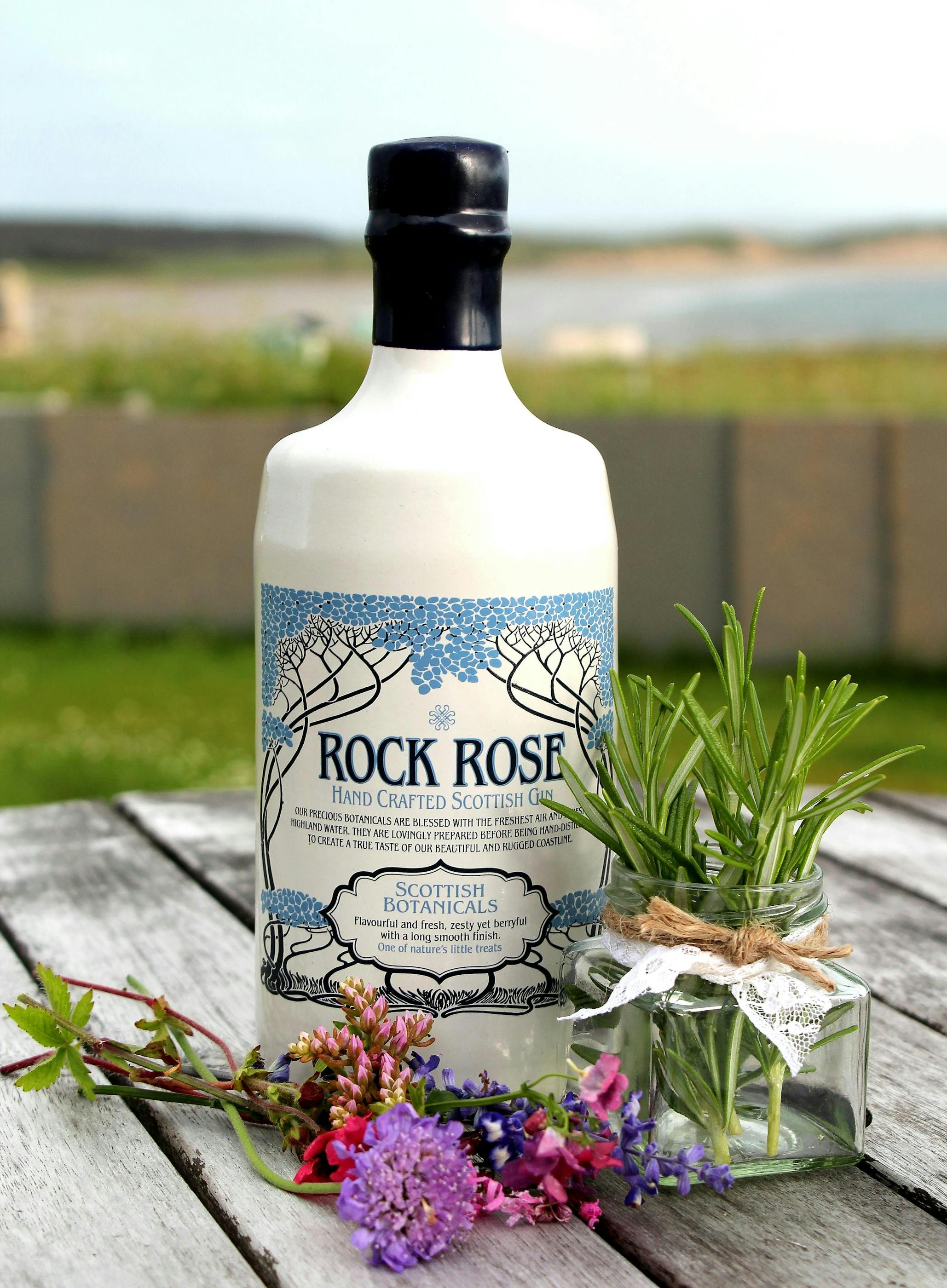
Rock Rose Gin's 500 Mile Gin Journey
Below is an excerpt from the August 2015 edition of GINNED! Magazine about Rock Rose Gin and the Dunnet Bay Distillery. Every month, Craft Gin Club Members receive a bottle of amazing small-batch gins and gin complements accompanied by GINNED! Magazine which is full of information about the gin, the distillery and loads of fascinating features.
Scotland’s North Highlands hold some of Europe’s most beautiful lands, lands steeped in history dating back thousands of years when Vikings settlers ruled the region and defined by rugged landscapes lush with flora and fauna. To bring together this history and nature, in 2014 the 500 miles of roads circling the sparsely populated coast were transformed into the North Coast 500, a route designed to attract tourists and introduce them to this area of incredible natural beauty.
If you follow the road, it will lead you to the cliffs around Dunnet Head, the most northerly point on the mainland UK. There you will catch a glimpse of a characteristic of the area that contributes to its beauty; the perennial flowering plant, Rhodelia rosea, more commonly known by several names including golden root, Arctic root, and rose root.
Humans have used the R. rosea for medicinal purposes as far back as 77 AD when a Greek physician recorded his knowledge of the plant. Writings of its benefits stretch to ancient Chinese texts. But the plant’s health properties are most closely associated throughout history with Viking cultures, the same cultures that a thousand years ago inhabited the Northern Highlands.
The Norse mastered R. rosea’s astringent attributes and applied the plant to open wounds, swollen limbs and even to lungs struggling to capture air. The plant’s high concentration of Vitamin C also made it the perfect scurvy deterrent, it’s pleasant smell enticed the Norse to turn it into hair wash and perfumes, and it’s use in the turf that made the roofs of nordic houses came about because it was thought to stave off the lightning flashed from the heavens by the Norse god Thor.
The Vikings believed that rose root would give them strength for their sea journeys and foraged for it in the weather-beaten rocky cliffs around Caithness, exactly where Martin Murray, the distiller of your August 2015 Gin of the Month, found it, distilled it and transformed it into the primary botanical after juniper in his gin, a gin he and his wife Claire quickly came to call Rock Rose.
A Rock Rose is a Rock Rose is a Rock Rose
“We realised that it’s a rose that grows in the rocks - a rock rose. After that lightbulb moment, there wasn’t ever any competition for the title of our gin,” Martin told GINNED! Magazine. “The leaf and the flower of rose root don’t taste particularly good, but the root is nice, although very astringent. By distilling it, we eliminated most of the astringency and a light rose aroma emerged. It’s an incredible botanical that really surprised us.”
Rose root - or rock rose as it may soon be called in the area - is not the only regional botanical that Martin and Claire use in their gin. Before reaching their final recipe, they tested over 80 botanicals introduced to them by Scotland’s longest practicing medical herbalist and local resident, Brian Lamb. Lamb, who concocts herbal nutritional supplements with a strong emphasis on skin care and cosmetics, helped the Caithness couple to discover rowan berries, hawthorn berries and watermint which they forage for in the local forest as well as sea buckthorn which grows on the coast.
The Rock Rose duo will eventually use juniper berries harvested in the region, a feat which is currently too difficult due to the decimation of juniper populations in Scotland in recent decades. They have joined the Caithness Biodiversity Group in its effort to rejuvenate the growth of juniper berries in the region and continue their support today in activities such as a survey of Dunnet Bay juniper taken this past June.
In place of local juniper, Martin and Claire found two types of their gin’s main ingredient - one from Italy and one from Bulgaria - both of which they enjoyed but which transmitted completely different flavours when distilled. Down to his last test batches, Martin couldn’t decide which to use until Claire suggested they use both, an intriguing idea as Rock Rose is the only gin we know of made with two species of juniper. After playing around with the berries, Martin found a ratio that worked for the style gin he sought to produce as well as the mixture and ratio of botanicals that would come to define the only gin from the North Highlands.
A Rose Sapphire
Rock Rose’s light signature style originates with the vapour-infusion process that Martin uses, a process pioneered by Bombay Sapphire back in the 1980s. The Bacardi-owned brand sought the lighter style at the time because gin as a category was in decline whereas vodka’s popularity was ever-growing: the brand reasoned that a lighter gin would attract vodka drinkers. Instead of macerating all of the botanicals directly in his still, Martin places them in a basket which rests at the top of the still and through which the steam of the heated base spirit passes, absorbing the flavour elements of the botanicals and carrying those elements with it as it re-condenses. Martin then eliminates the heads and the tails - those parts of the resulting spirit not suitable for consumption - through his trained nose, far from an easy task.
For the special Distiller’s Edition that Craft Gin Club Members have the exclusive chance to taste this August, Martin tweaked the mixture of his standard botanicals and added an additional two that through numerous tests he found complemented each other strangely yet perfectly: lavender and apple. Two species of lavender grow on the Dunnet Bay Distillery property so Martin had an abundant supply with which to experiment. The apples are sourced from a farm on the Black Isle, a peninsula about eighty miles to the south of the distillery. But sourcing the apples wasn’t enough. Martin needed to find the best way of distilling them. It turns out, that best way starts with apple juice.
After placing the botanicals in their basket - in which the plants are tightly packed - and before turning on his still, Martin stands over the basket, slowly trickling the apple juice into the basket where the dried botanicals absorb it all, themselves rehydrated au jus de pomme before their exposure to the spirit steam, a very unique twist on Bombay Sapphire’s vapour-infusion.
For each Rock Rose batch, Martin conducts a 12-hour distillation process, a very slow steam compared to many other gins. The infused spirit then rests in stainless steel vats for three days before being brought down to bottling strength with water from the local reservoir of Calder Loch and bottled in what has already become an iconic bottle in the craft industry, one made from ceramic in a style reminiscent of jenever bottles and which won Best New Product Launch Design at the 2015 World Gin Awards.
Dunnet Bay Gintage
The gin itself won two silver medals at the June 2015 Gin Masters Awards, one of a number of competitions in which Martin and Claire could enter their gin every year because unlike many gins, Rock Rose will be distinct every year. “It’s a challenge to juggle 18 different botanicals and balance them every year to achieve the same flavour,” explained Martin. “This year has been very rainy in Caithness so when we harvest our local botanicals, they will taste slightly different. You just can’t control nature!”
With the uniqueness of yearly vintages of their standard gin as well as the Distiller’s Editions - the first of which Craft Gin Club Members are exclusively tasting this month - they will produce and sell only at their premises, Martin and Claire have poised Rock Rose Gin to be one of the most successful of the growing number of craft gins, a success in which people from far and wide will revel as they pop off the North Coast 500 to visit the Dunnet Bay Distillery.







